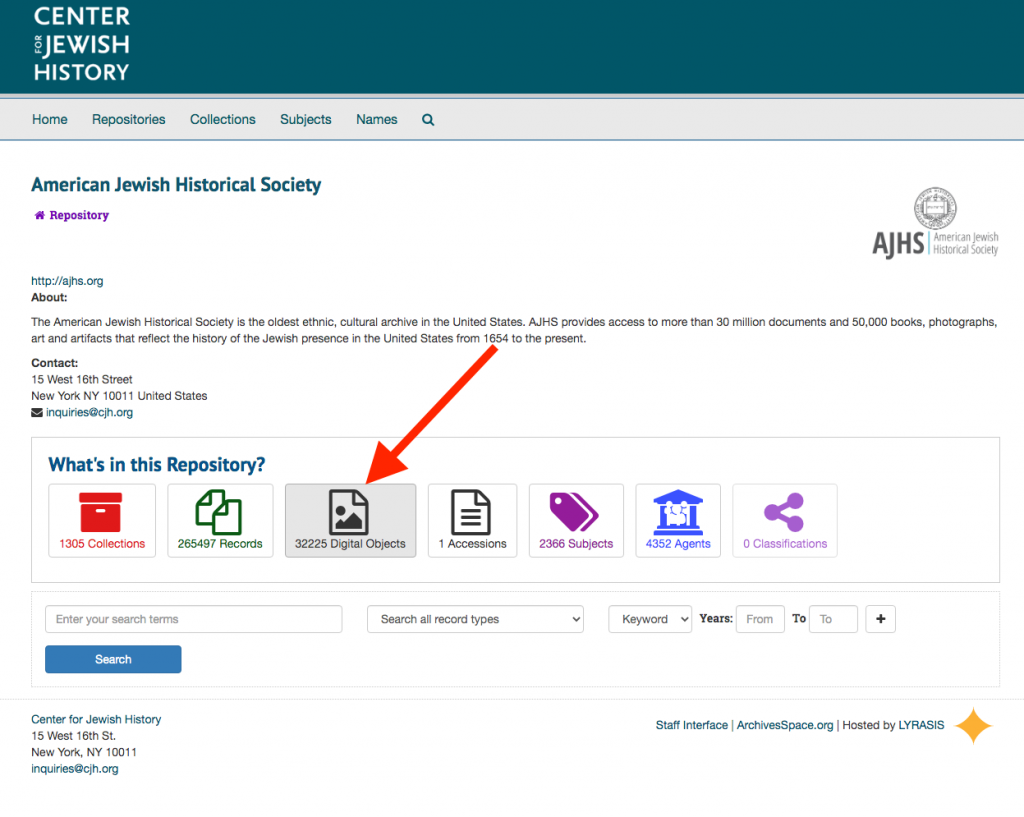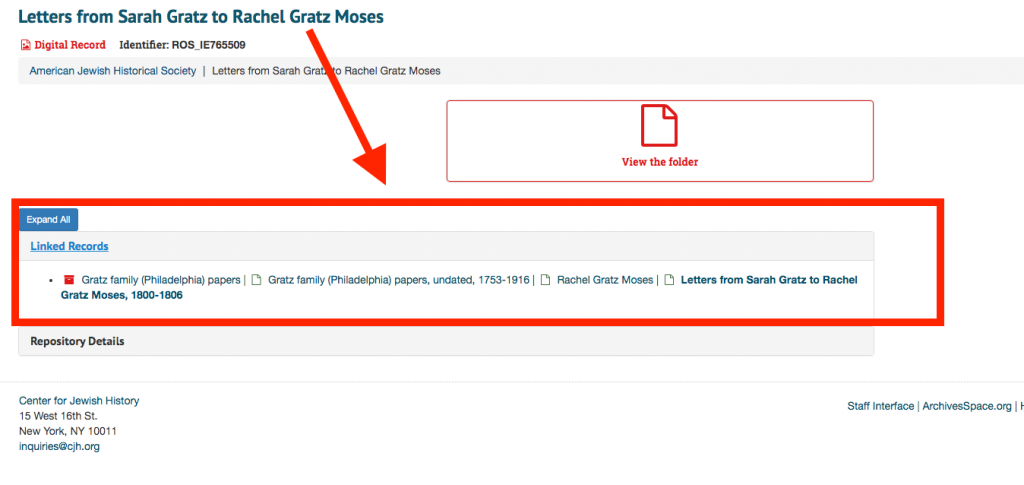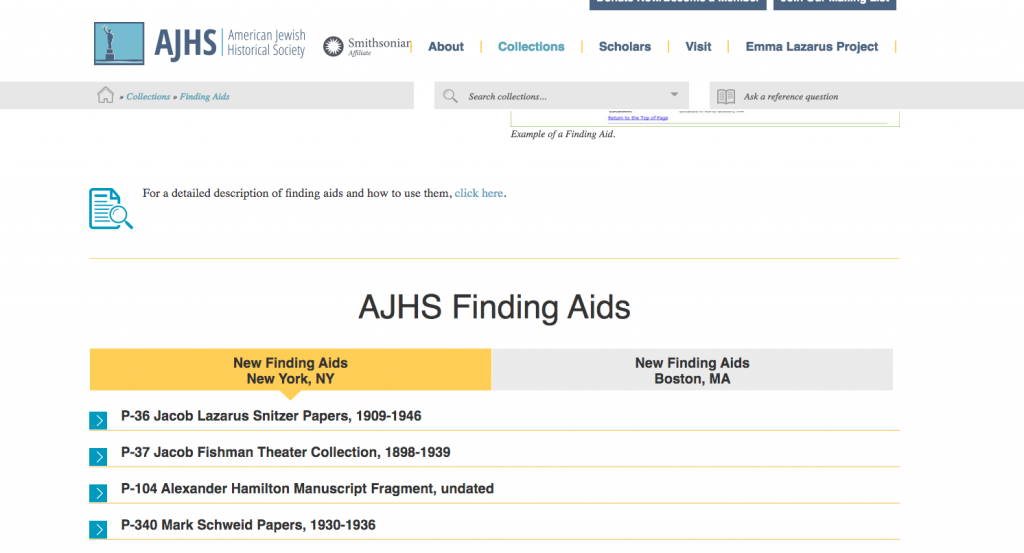It’s time to start deciding what you would like to make an exhibit about.
Before you begin, check with your professor to get some guidance on possible topics, eras, places, or themes. If your professor hasn’t assigned specific topics on which to create an exhibit, you may want to brainstorm to create a list what you have read about in your class that you want to know more about.
Here are some tips:
1. Start with Items that Have Already Been Digitized
Many of the collections at AJHS focus on people or instiutions, so while while it may be tempting to start with a theme (baseball! summer camps! WWII!), for the purpose of this exercise, we suggest instead that you start the items that have already been digitized by the historical society:

Once you have selected the digitized objects, you can filter the digital results by using a name or a range of years:

To find items that are related, expand the “linked records” tab.

2. Start with a Finding Aid
Another way to find a group of records that are already connected is by starting your research with a finding aid.

3. Start with Related Set of Digitized Items
Or you may want to start with one of the collections that has already been digitized. These include:
The Loeb Jewish Portrait Database
“The world’s most extensive online gallery of portraits made of American Jews in the Colonial and Antebellum Periods.” If you are working on this collection you may find the tutorials on Image Analysis useful.
The Museum Collections
“The Museum Collection of the American Jewish Historical Society holds many unique treasures including paintings, daguerreotypes, silhouettes, textiles, silver objects, medals and ribbons, domestic and religious objects, sports and family memorabilia, military uniforms, political and theater posters, rabbinical regalia, correspondence, newspapers, and photographs. Together, the collection reflects the variety of American Jewish culture as expressed in the synagogue, in ritual practice, in the home, in entertainment, and even in sports.”
Moses Family of New York Papers
CollectionIdentifier:P-1Overview This collection contains the personal and business papers of the Moses family, along with family genealogical materials. Isaac Moses (1742-1818) was a prominent New York businessman and American patriot who helped fund and supply the US forces during the Revolution. His descendants were prominent Jewish businessmen in New York who traveled internationally, and served in the Union Army during the Civil War.Dates: undated, 1767-1941, 1971Found in: American Jewish Historical Society
Rabbi Emery Glancz, World War II Rabbi/Cantor Military Kit with Flag
CollectionIdentifier:I-517Overview This collection contains the chaplain’s kit used by Rabbi Emery Glancz during his service as an army chaplain during World War II. Included in the kit is a flag with the Ten Commandments; one Ten Commandments plaque; two brass candlesticks, one marked “US;” two brass communion plates marked “US;” one brass priest’s communion cup with cross; and three silver-plated cups.Dates: circa 1940sFound in: American Jewish Historical Society
American Soviet Jewry Movement Oral Histories Collection
CollectionIdentifier:I-548Overview The collection contains audio and video interviews with activists of the American Soviet Jewry Movement, former Refuseniks and Prisoners of Conscience.Dates: 2008-2011, 2013-2014Found in: American Jewish Historical Society
Elaine Pittell Papers
CollectionIdentifier:P-873Overview Papers of Elaine Pittell cover the period from mid-1970’s to early 1990’s and document her and her husband’s Robert Pittell’s activities as the Chair of the Jewish Federation of South Broward’s Soviet Jewry Committee. The documents include correspondence, memos, minutes, publications, news clippings, audiocassettes, videocassette, disc negatives and pins.Dates: undated, 1974-1991, 1993, 1994; Majority of material found within 1975 – 1988Found in: American Jewish Historical Society
Adolf Lorch (1883-1971) Papers
CollectionIdentifier:P-1010Overview This collection consists of materials related to Adolf Lorch’s efforts to support the emigration of family members and others from Germany between 1934 and the early 1950s. The bulk is made up of correspondence and affidavits. Also included are other family papers, business correspondence, a biographical sketch, and a photograph of Lorch.Dates: 1896-2013; Majority of material found within 1934 – 1941Found in: American Jewish Historical Society
Bernard C. Ehrenreich Papers
CollectionIdentifier:P-26Overview The Papers of Bernard Calonius Ehrenreich, a Rabbi and civic leader in Montgomery, Alabama, document his personal and professional life over seven decades, and highlights his involvment in a broad range of organizations and activities. The collection is valuable to those researching topics such as Zionism; Progressivism; boys’ camps; Montgomery, Alabama’s Jewish community; Christian-Jewish relations in the South; and soldiers’ correspondence from World War I and World War II. In addition, Ehrenreich’s involvment in organizations such as the National Jewish Welfare Board; National American Woman Suffrage Association; Intercollegiate Menorah Association; Federation of American Zionists; and Zeta Beta Tau Fraternity are documented within the collection as well as postcards displaying various Jewish images.Dates: undated, 1871-1971Found in: American Jewish Historical Society
Board of Delegates of American Israelites Records
CollectionIdentifier:I-2Overview The Records of the Board of Delegates of American Israelites (1859-1878) documents the life cycle of the Board of Delegates, a Jewish civil rights organization located in New York City. The Board served primarily in a two-fold function: acting as a central organization for American Jews and working on behalf of Jews abroad. To the latter end, the Delegates collaborated with the Committee of Deputies of British Jews and the French Alliance Israélite Universelle to provide for the relief and aid, civil, and religious rights of Jews throughout the Americas, Europe, North Africa, and the Middle East, particularly Romania, Ottoman Palestine including Jerusalem, and Morocco. In the U.S., the Delegates were partially responsible for the appointment of the first Jewish Military Chaplain and surveyed member synagogues concerning the history and size of their congregation, the first organization to systematically record this type of information in the States. The Delegates merged with the Union of American Hebrew Congregations (UAHC) in 1878 and dissolved in 1925. Correspondents include Adolph Crémieux, Sir Moses Montefiore, Benjamin Franklin Peixotto, Isaacs S. Myer, the Rev. Dr. Arnold Fischel, and Maj. General Benjamin Butler. Documents include correspondence, minutes, committee reports, memorials, announcements, surveys, some printed material including clippings, and a 1932 Rabbinical thesis on the Delegates by Allan Tarshish.Dates: 1859-1881, 1887, 1932Found in: American Jewish Historical Society
Laurel Gould (1931-2008) and Alan J. Gould (1929- ), papers
CollectionIdentifier:P-866Overview The collection contains papers of Laurel Gould and her lawyer husband Alan J. Gould, activists of the American Soviet Jewry Movement involved with the Union of Councils for Soviet Jews in Washington D. C. area and in the San Fracisco Bay area, Northern California Lawyers Committee for Soviet Jews and the National Conference on Soviet Jewry. The bulk of the collection covers the decade of 1970 through 1980. The materials include correspondence, memoranda, individual files on Soviet Jewish Refuseniks, documentation of special projects, events and visits to USSR, publications, legal materials pertinent to the Soviet Jewry, photographs, slides and audio recordings of conversations and interviews with the Soviet Jews.Dates: undated, 1963, 1969-1982; Majority of material found within 1970 – 1980Found in: American Jewish Historical Society
Washington Committee for Soviet Jewry Records
CollectionIdentifier:I-540Overview The collection contains records of the Washington Committee for Soviet Jewry, a grassroots volunteer membership organization that was founded in 1968 and existed until 2001. The organization was renamed the Greater Washington Committee for Post-Soviet Jewry after the disintegration of the Soviet Union in 1991. The Committee worked to raise awareness of the plight of Soviet Jewry in the United States and supported Jewish communities on the U.S.S.R. territories, during the rule of the Soviet regime and after its collapse. The records cover the period from the mid-1960s through 2001, and the bulk of the collection is dated 1970s-1980s. The documents include correspondence, memoranda, publications, news clippings, photographs, slides, ephemera, audio and video recordings and 3-D objects. Originally the collection was titled Papers of Carolyn W. Sanger, *P-870 by the name of the Committee’s last president.Dates: undated, 1962, 1965-2001; Majority of material found within 1970 – 1990Found in: American Jewish Historical Society
Chicago Action for Soviet Jewry, records
CollectionIdentifier:I-530Overview The records of Chicago Action for Soviet Jewry (CASJ, after 1991 known as Chicago Action for Jews in the Former Soviet Union, CAJFSU), a grassroots volunteer organization dedicated to helping Soviet Jews emigrate from the Soviet Union and protecting the Refuseniks. CASJ was founded in the early 1970s as a result of the formation of the national organization, the Union of Councils for Soviet Jews, which included approximately 50 other local councils. The collection documents the CASJs activities from its inception until it closed in 2010. The collection also features materials related to the activities of CASJ’s umbrella organization, Union of Councils for Soviet Jews and its legal arm Soviet Jewry Legal Advocacy Center. The materials include correspondence, memoranda, case files, trip reports, publications, photographs, posters, audio, video, and three-dimensional artifacts.Dates: undated, 1961, 1964, 1967, 1969-1970, 1972-2010; Majority of material found within 1975 – 2010Found in: American Jewish Historical Society
Franks Family Papers
CollectionIdentifier:P-142Overview Originally from England, the Franks family were colonial merchants who settled in New York City in the 1700s. This collection documents parts of their life through correspondence, legal documents, and financial records. The correspondence is primarily written by Abigail Franks in New York to her son, Naphtali, in England. Also included in the collection are the notes and correspondence of Dr. Leo Hershkowitz, who co-edited a book on the letters of the family entitled the Lee Max Friedman Collection of American Jewish Colonial Correspondence: Letters of the Franks Family (1733-1748), written with Isadore S. Meyer in 1968.Dates: 1711-1821, [1965-1968]Found in: American Jewish Historical Society
Hebrew Immigrant Aid Society (HIAS) Records
CollectionIdentifier:I-363Overview The records of the Hebrew Immigrant Aid Society, now known as HIAS, comprise much of the history of HIAS through the second half of the 20th century, primarily through the files created by leadership based in the New York headquarters. Since the 1880s HIAS has worked with immigrants and refugees to help them emigrate legally from their home countries to safe resettlement in the United States and elsewhere, and they continue this work today. The records focus on files of the Executive Directors, including James P. Rice, Gaynor I. Jacobson and Karl D. Zukerman, and other material created by executive staff and by the Board of Directors. Also of importance is the work of the HIAS United States Operations Department in the New York office, handling the everyday details of immigration documentation, migration issues and resettlement activities in connection with communities throughout the United States, and in coordination with HIAS staff in overseas offices and the other departments in New York and Washington, D.C. In addition, more than 1100 files of legacy photographs have been digitized as part of this project and made accessible online.Dates: undated, 1909-2003; Majority of material found within 1954 – 2000Found in: American Jewish Historical Society
